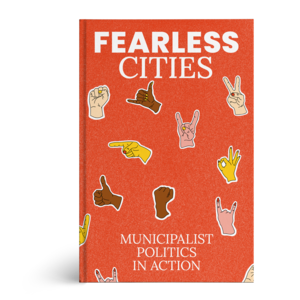Document:Degrowth Municipalism could change the world
| By shifting the focus of politics beyond the nation-state, by doing things in practical and tangible ways, municipalism opens up a space for new thinking. It is easier to get head around degrowth, seeing it in action near you and thinking in a space without the baggage of the capitalist nation-state. |
Subjects: Degrowth, Municipalism, economic growth, social movement, capitalism, nation-state
Source: Bella Caledonia (Link)
★ Start a Discussion about this document
Degrowth challenges the widespread doctrine that economic growth ensures our collective well-being. Instead, it argues that in order to provide a good life for all, we need economic contraction alongside redistributing resources more equitably, as infinite growth is impossible on a finite world. Municipalism is about people collectively imagining our lives, acting locally and thinking globally, trying to live beyond crisis and structural oppression – many ways to co-create a good life for all. In a world dominated by the crises of capitalism and nation states, both ideas are gaining momentum. Both are movement multipliers – spaces where political causes intersect.
“New municipalism” and Fearless Cities
Fearless Cities summits are international spaces to explore, elevate and skill-share how people can change the world acting locally through municipalism. They have converged from New York to Naples, from Warsaw to Valparaíso in Chile. Fearless Cities began in Barcelona in 2017, two years after social movements there combined and won the city hall elections.
I was one of the co-organisers of Fearless Cities in Sheffield, organising Municipalist Futures, one of the four strands alongside Democracy, Care and Commons. On the first weekend of November, the summit was also organised by Opus Independents, Research for Action, Citizen’s Network and CareFull. On these isles there are many social movements building local power and autonomy – yet few movements that describe themselves as “municipalist”. A key aim of the summit was to show how through municipalism social movements can be greater than the sum of their parts. In total, around 400 people took part in workshops, panel discussions, meetings and assemblies held in the University of Sheffield.
In 2015, social movements combined into municipalist platforms and won local elections in Barcelona, Madrid and many other cities across the Spanish state. The Fearless Cities Summits, founded by Barcelona en Comu, were a medium that put this “New Municipalism” higher up the international agenda. The first summit was initiated by Barcelona en Comu. Although there are many examples of municipalism before the Spanish wave of 2015. European examples include the urban commons of Naples, more distant examples such as the autonomous democratic confederalism in north-east Syria.
Barcelona en Comu governed from 2015 to 2023. Transformations to their city included actively reducing tourist numbers; fining property speculators for vacant properties; creating superblocks, areas where pedestrians and active transport are prioritised and cars are severely restricted; and in 2017, creating Barcelona Energia, a municipal energy supply that provides renewable and affordable energy beyond the profit motive dominating Spanish energy companies.
So if that’s new municipalism, can we speak of an ‘old municipalism’? Archaeological evidence suggests that many of the first cities were co-created in a non-hierarchical way, with people often living in far more equitable material conditions. Examples include Çatalhöyük (7,400-5,900bce) in present-day Turkey and Taljanky and other nearby cities in present-day Ukraine (4,100-3,300bce). From the earliest known times to the present day, there are many other examples of municipalism.
Sasha Josette of the Working Class Climate Alliance spoke at Fearless Cities opening plenary about how her many-times-great-grandmothers in Kerala organised resistance to British imperialism using strategies and means akin to municipalism. These were women-led local power networks – even if they were not defined as such.
All this points to a tension about municipalism. For time, people have collectively organised locally. But today there are few examples of people doing it. Municipalism is an exception to the rule of most people live under systemic domination of corporations and nation-states. Degrowth faces a similar conundrum. David Graeber and David Wengrow point out that early evidence for it goes back to Taljanky and similar local cities in Ukraine in the 4th millennium bce, where their “ecological footprint was minimal, likely including a conscious effort “to avoid large-scale deforestation.” For more on this see here.
Yet even if it is an idea as old as time and consistent with the laws of physics, degrowth as a political idea is considered heretical. Like municipalism, both are seen beyond the scope of political possibility.
The Right to the City and Degrowt
One early inspiring impact of Fearless Cities was the large number of applications we received in response to the open call to hold workshops or sessions at the summit. The Municipalist Futures strand was largely developed by bringing together the contributions of these participants in meetings, workshops and discussion panels. This included the panel entitled: The Right to the City and Degrowth. The right to the city – the idea – is a core horizon of municipalism. It is about meeting the material needs of all people and giving them equal access to the city, resources and its space. Furthermore, it moves up Maslow’s hierarchy of needs, asserting that the city belongs to all of us, that we must shape our cities together in a democratic way and enable autonomy.
Robbie Gillett was one of the five speakers. He works for Adfree Cities, a network of local organisations that opposes the outdoor advertising that has become ubiquitous in our cities, especially on public transport. This corporate propaganda is the opposite of the right to the city, where corporations are effectively able to shit in our heads and promote hyper-consumption, which ties in seamlessly with degrowth.
Ellie Harrison of Get Glasgow Moving also spoke, this movement aims to make public transport affordable, decent and publicly owned. Similar to anti-advertising, there are island-wide urban campaigns to municipalise bus services. These have been successful in Manchester and Liverpool, among others.
Those in Strathclyde or South Yorkshire can input into ongoing efforts, to reimagine a more inclusive transport cities that moves away from the huge ecological impact of private transport.
Giulia Massolino of Adesso Trieste was another speaker. This municipalist movement in northern Italy that has councillors, including Giulia, in opposition on the city council. Adesso Trieste (Trieste Now) is led by participatory processes, for instance crowd-sourcing its electoral platform before elections. Or participatory walks through the city that create dynamic spaces for political debate and imagination. As mentioned about Barcelona en Comu, winning city government power enables social movements to take real action to reduce a city’s ecological footprint. Giulia explained how this is also possible in opposition at city hall, by working with other parties to establish active transportation routes, for example, or to regreen a post-industrialised area of the city through a participatory laboratory.
So how does the emerging degrowth movement relate to municipalism? Krisztina Campbell spoke from Degrowth London spoke about this. This is one of many degrowth movements emerging around the world. She pointed out numerous overlaps between degrowth and municipalism and explained how the dominant mindset need to move beyond neoclassical economic thinking that looks at states like households budget, a circular thinking that limits scope. Krisztina also talked about how degrowth as an emerging idea is predominantly discussed by academics, with more focus on theory compared to practical action. It wasn’t that long ago in these isles municipalism was only really discussed in similar scholarly circles.
Lucas Snaije responded to a top FAQ for municipalists: “This all sounds great, but how does local action solve global crises?”. He spoke on behalf of the Fossil Fuel Non-Profileration Treaty. This movement is driven by nations and communities in the Majority World (aka Global South). Signatories commit to end the use of fossil fuels, similar to previous treaties to end the proliferation of nuclear weapons and landmines. This treaty is an example of municipalities – alongside nations that are extremely vulnerable to the climate meltdown that they did not cause – forming a translocal alliance for degrowth. It blazes a trail towards small states, cities, towns and villages being key actors against global systemic crisis.
Fighting corporate advertising, greening community transportation systems, building translocal alliances: these were just some of the practical ways we can act at the local level to move towards a degrowth future. They answer the issue of how the degrowth movement can move from ideas to action. In addition, there were many other examples, both in the panel – and throughout the summit – of how municipalists and/or urban social movements are pushing us towards degrowth – even if they are not (yet) doing so in the language of degrowth.
Further examples of how muncipalist-esque projects pushing degrowth include rebuilding a food system around local buyer’s cooperatives on working class streets, creating local assemblies to build counter-power, and networking and strengthening the solidarity economy. All of these examples come from these isles. I say “municipalist-esque” here because while many of these movements do not yet identify with that label. But for those who did, this is autonomous municipalism – that is, they see the local as the core arena of politics instead of the state (like platform municipalism), but instead of social movements wanting to take over city hall – this is about building power autonomously.
Discussions across the summit emphasised the extra difficulties the dysfunctional electoral system – especially in England – and dominance of big parties place for platform municipalists, Flatpack Democracy in rural areas of mainly southern England is a notable exception. This means autonomous municipalism offers more opportunities here. The urban commons of Naples are an example of autonomous muncipalism: former grands abandoned buildings run as social centres, cultural spaces and mutual aid spaces by weekly assemblies. Degrowth Municipalism
Why does municipalism need degrowth? Adjusting a just transition phrase, simply: There is no liberated and socially just city on a dead planet. But the potential symbiosis goes deeper into the framework where beliefs are turned into supposed facts. To get to this other future, Degrowth Municipalism moves us not only beyond the capitalist state, but also its substantiating myths.
Many people would consider a future without economic growth unimaginable. But many of these people would also agree that constant economic growth is impossible on a finite planet. There is a conflict between the laws of physics and the man-made “laws of politics”. Municipalist action can help to overcome this cognitive dissonance. At Fearless Cities, the discussion touched on how many people you meet on the street – would resist terms like degrowth or anti-capitalism. This is despite the fact that these same people are totally against public advertising or the influence of corporations on our cities and lives. By shifting the focus of politics beyond the nation-state, by doing things in practical and tangible ways, municipalism opens up a space for new thinking. It is easier to get head around degrowth, seeing it in action near you and thinking in a space without the baggage of the capitalist nation-state.
Cities were crucial to the development of the our human journey long before anyone started constructing capitalism, economic growth, structural oppression and the colonial version of the nation-state. Through Degrowth Municipalism it is possible for cities to continue to play a seminal role going forward, as these contemporary considerations fade into history.

